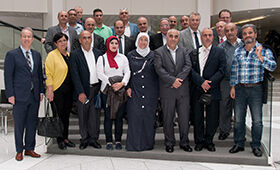Labour-market oriented initial and advanced education and training based on the German model
Delegation from the Palestinian territories visits the BIBB
As part of a five day study visit, on 2 June Palestinian representatives from the areas of VET policy making and business met with experts from the Federal Institute for Vocational Education and Training (BIBB) to find out about the German dual system of vocational education and training.

The high-ranking delegation led by Khalil Y. A. Rezeq, President of the Federation of Palestinian Chambers of Commerce (FPCCIA) and Nasser S. A. Qatami, Vice President of the Palestinian Ministry of Labour (MoL) also included the presidents of the individual chambers and the directors of the vocational training centres. The visitors from the Palestinian territories were aiming to learn more about how business and government vocational education and training policy interacts based on the German example.
The focus of the event in the BIBB was on sharing experiences of the needs-based development of initial and continuing vocational education and training. In his welcoming address, BIBB President Prof. Dr. Frie-drich Hubert Esser both praised and emphasized the progress made so far in the development of Palestinian vocational education and training, as evidenced, for example, by the introduction of the Palestinian qualifications framework in the previous year. Esser added that, the visit to Germany should not just be to provide guests from the Middle East with information regarding the German system, but that it should be also used as an opportunity “to get to know more about the Palestinian vocational education and training system and about the projects taking place at a local level”.
The presentation and discussion focussed on the interaction of employees, employers and government stakeholders in shaping the German vocational education and training system. The delegation was particularly interested in the role of social partners and in the cooperation of stakeholders in the formulating and revising of training regulations. “We can only ensure that the standards satisfy the requirements in practice, if social partners are involved”, explained Peter Rechmann from GOVET- German Office for International Cooperation in Vocational Education and Training at the BIBB. In this way, all parties involved benefit from the cooperation. Finally, “good vocational education and training is the route to employment and income”.
The journey made by the delegation is taking place in the context of the VET Partnership Project (BPP) which the Cologne Chamber of Crafts and Trades (HWK) has maintained with the Palestinian chambers, associations and vocational education and training establishments since October 2015. The project is fund-ed by the Federal Ministry for Economic Cooperation and Development (BMZ). The objective of the initial project phase (which runs until September 2018) is to utilize collaboration between chambers, asso-ciations and government departments to make sustainable improvements to vocational education and training in Palestine. One of the project aims is that chambers set up their own vocational education and training departments. With the support of an expert from the Chamber of Crafts and Trades, an initial training workshop for vocational education and training has already been successfully implemented in April of this year.
As part of the project, the next step will be to implement the following measures:
- Establishing technical continuing education and training provision at all Palestinian chambers.
- Improving the teaching qualifications of Palestinian teachers at vocational schools involved in the cooperation.
- Improvements to the necessary equipment in the workshops of those vocational schools involved in the cooperation.
Successful cooperation has already taken place in the past between the BIBB, German Agency for International Cooperation (GIZ), and the Palestinian territories. This resulted, amongst others things, in the development of a Palestinian qualification framework, classification of Palestinian occupations and a funding concept for the vocational education and training system.